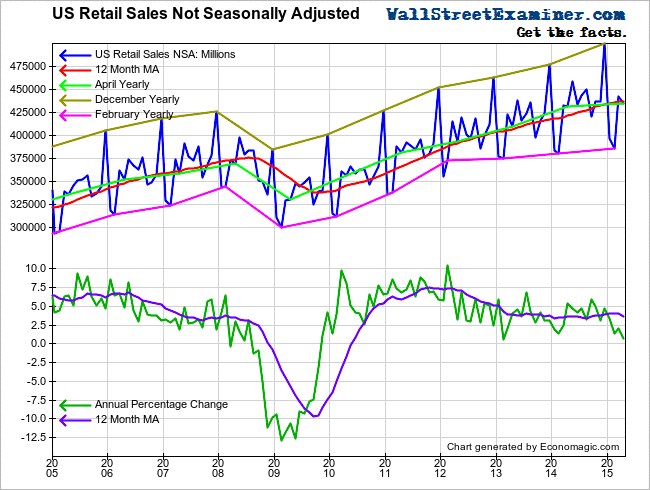Headline writers were falling all over themselves yesterday to get the news out that retail sales were weaker than the Street conomist crowd consensus guess. The stock market soared as trading algos surmised that this meant that the Fed won't raise rates anytime soon.
There's just one problem. As so often is the case, the seasonally adjusted headline number was highly misleading. Seasonally maladjusted nominal retail sales were reported to be unchanged in April. The Wall Street conomist consensus was for a modest gain of 0.2%.
Nominal retail sales, not seasonally adjusted and not adjusted for inflation (or deflation), declined by $7.5 billion in April versus March. April is almost always a down month, so this drop is not unusual in any way. In fact the month was near the average change for the past 10 years of -$7.9 billion. April 2014 was down just $1.5 billion, but April 2013 was down $13.3 billion. So there was absolutely nothing remarkable about this year. It wasn't too hot. It wasn't too cold. It was middling.
On a year to year basis, nominal sales rose just 0.7%, which was a sharp deceleration from the recent growth rate. March had a 2.1% year to year gain. April had the smallest yearly gain since a +0.6% reading in February 2013. These are nominal sales and the early indications are that consumer prices slipped slightly in April. Using PPI for finished consumer goods as a proxy for April CPI, real retail sales show a higher growth rate. There's no evidence here that the economy is sliding into a ditch. But that's what traders are betting on, that a weak economy will keep the Fed from raising rates.

Nominal Retail Sales- Click to enlarge
Nominal total retail sales does not consider consider the skewing effect of gas prices. Much of the slowing in the growth rate is attributable to the decline in gasoline prices, which reduced total nominal sales over the past 10 months.



